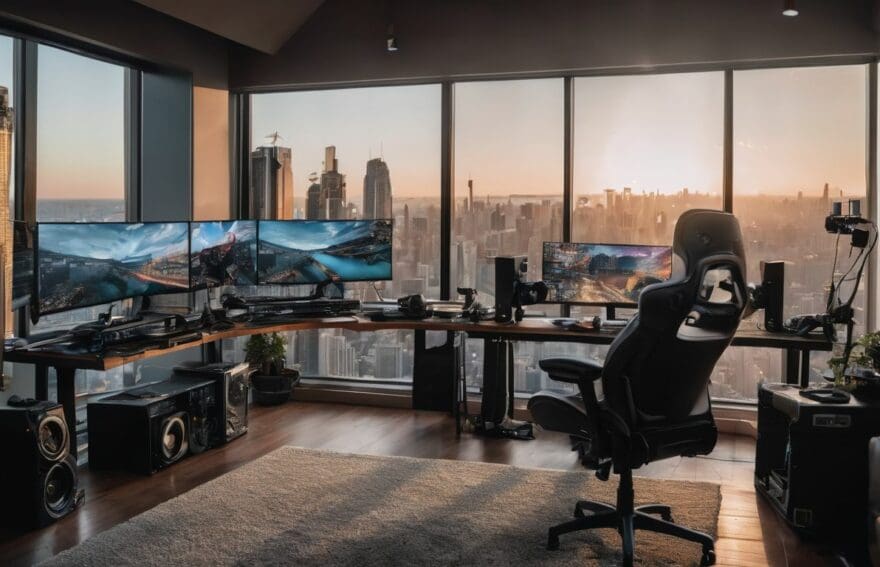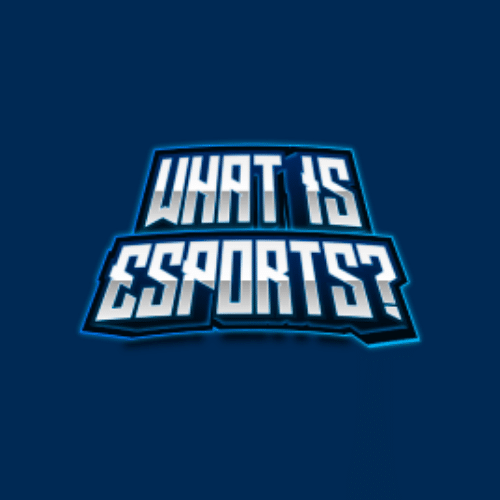The Physical Demands of Professional Gaming

Updated On: November 29, 2025 by 
Many of us relish the excitement and challenge that competitive gaming brings to the table, but it’s not always a bed of roses when we consider our health. Just like you, we’ve experienced the toll that those marathon gaming sessions can take on our bodies; interestingly enough, a whopping 92.7% of professional esports players incorporate physical activities into their routine to counter these effects.
Our article is brimming with practical advice to combat the physical demands that gamers such as ourselves often sideline. So what do you say? Shall we boost both your gameplay and well-being to new heights? Let’s get stuck in!
The Growing Popularity of Esports
Esports, or electronic sports, refers to competitive video gaming at a professional level. With the rise of online streaming platforms like Twitch and the growing number of esports tournaments worldwide, it’s no wonder that esports has become a global phenomenon.
As technology continues to advance, the future of esports looks promising with even more growth on the horizon.
Definition and history of esports
We define esports as competitive gaming at a professional level, where individuals or teams play video games against each other in tournaments that are often watched by millions of fans worldwide.
This phenomenon isn’t new; it traces back to the early 1970s with the first known video game competition centred around the game “Spacewar!” held at Stanford University. By the 1980s, arcade games like “Pac-Man” and “Donkey Kong” hosted major competitions, setting the stage for what would become a booming industry.
As technology advanced, so did esports. The 1990s saw the rise of networked gaming and with it came an increase in organised tournaments featuring games such as “Quake.” Moving into the 21st century, internet connectivity paved the way for massive multiplayer events and online streaming services like Twitch further catapulted esports into mainstream entertainment.
Today’s landscape showcases highly sophisticated leagues and events that command audiences rivalling traditional sports – capturing our screens and imaginations with every match played.
Current state and future growth
Esports has experienced exponential growth, with over 380 million viewers and a market value of $1.1 billion in 2020. The industry continues to expand rapidly, with an estimated revenue projection of $1.5 billion by 2023.
Esports is increasingly recognised as a legitimate form of entertainment and competition, attracting professional gamers from around the world who compete in major tournaments for substantial prize pools.
The future looks promising for esports, as it gains further recognition and support from established sports organisations and sponsors. As the industry evolves, there is potential for greater investment in training facilities, leagues, and athlete development programmes specifically tailored to meet the unique physical demands and mental abilities required for professional gaming.
The Physical Demands of Esports
Esports place significant physical demands on the body, impacting the musculoskeletal, visual, cardiovascular, and respiratory systems. In addition to these physiological challenges, cognitive and neural demands also play a crucial role in esports performance.
Musculoskeletal system (concerns and injuries)
Professional gaming puts a significant strain on the musculoskeletal system, increasing the risk of injuries such as carpal tunnel syndrome and repetitive strain injuries. Gamers are prone to wrist, hand, and back issues due to prolonged gameplay sessions.
Maintaining a proper posture and taking regular breaks is crucial for preventing these concerns. The physical demands of esports require players to pay attention to their body’s needs and ensure they engage in exercises that strengthen key muscles and promote overall well-being.
Gaming can lead to overuse injuries, impacting the wrists, fingers, elbows, shoulders, and neck due to repetitive movements during gameplay. These concerns highlight the importance of incorporating specific exercises aimed at maintaining flexibility and strength within these areas.
Visual system (eye strain and fatigue)
Esports demands intense focus on screens, leading to eye strain and fatigue. Maintaining healthy vision is crucial for gamers’ performance. Limiting screen time, taking regular breaks to rest the eyes, and adjusting lighting conditions can alleviate eye strain and reduce fatigue.
Also, using blue light filters on screens may help in preventing long-term damage to the eyes.
Regular eye check-ups are essential for esports athletes due to the prolonged exposure to screens. Eye exercises can also improve visual health and reduce strain while gaming. Staying hydrated is important too, as it can prevent dry eyes caused by staring at screens for extended periods of time.
Cardiovascular and respiratory systems (sedentary lifestyle)
Sedentary lifestyle in esports poses risks to our cardiovascular and respiratory systems. Prolonged sitting can lead to reduced blood flow, impacting heart health and increasing the risk of conditions like high blood pressure and heart disease.
Additionally, inactive periods may compromise lung function, affecting oxygen intake and carbon dioxide elimination. To combat these effects, maintaining physical activity outside of gaming sessions is crucial for improving overall cardiovascular fitness and respiratory capacity.
Regular exercise supports healthy circulation, reducing the likelihood of blood clot formation and promoting efficient oxygen transport throughout the body. Engaging in cardio workouts can also enhance lung capacity, making it easier to breathe during intense gaming moments.
Cognitive and neural demands
Esports demand high cognitive functioning and neural engagement, as players must quickly process information, make split-second decisions, and strategise effectively. The fast-paced nature of competitive gaming requires sharp reflexes and the ability to think on the spot.
Gamers need to stay mentally agile and focused for extended periods, leveraging their cognitive abilities to outmanoeuvre opponents and achieve victory.
The neural demands of esports are akin to those required in traditional sports, with intense concentration, hand-eye coordination, and rapid decision-making all playing crucial roles.
These mental demands highlight the importance of maintaining brain health through proper nutrition and regular exercise. A strong mind is just as essential as a healthy body in optimising performance for professional gaming athletes.
Nutrition and metabolism
Esports athletes need to pay close attention to their nutrition and metabolism. A balanced diet with adequate protein, complex carbohydrates, healthy fats, and a variety of fruits and vegetables is essential for physical and mental well-being.
Consuming small, frequent meals throughout the day can help maintain energy levels while preventing spikes in blood sugar. Proper hydration is also crucial for cognitive function and overall performance, as even mild dehydration can negatively impact reaction time and decision-making abilities.
Additionally, maintaining a consistent sleep schedule is vital for metabolism regulation, muscle recovery, and cognitive function.
To support peak gaming performance, esports athletes should be mindful of their nutritional intake before competitions or intense practice sessions. Complex carbohydrates provide sustained energy levels while lean proteins aid in muscle repair and recovery.
The Importance of Physical Training for Esports Athletes
Esports athletes require specific physical training to enhance their reflexes and hand-eye coordination. Maintaining a healthy lifestyle through exercise and fitness routines is crucial for their performance in competitive video game tournaments.
Specific exercises and training for reflexes and hand-eye coordination
- Engage in regular physical exercise to boost overall fitness and agility, contributing to improved hand-eye coordination.
- Utilise reaction time training tools and software to specifically target reflexes and response times.
- Practise visual tracking exercises, such as following moving objects or dots on a screen, to enhance hand-eye coordination.
- Incorporate drills that focus on quick decision – making and precise movements to sharpen reflexes during gameplay.
- Use specialised gaming equipment or tools designed to improve hand-eye coordination, such as speed balls or laser pointer activities.
Maintaining a healthy lifestyle
To maintain peak performance, professional gamers must also prioritise their physical health. Regular exercise and fitness routines play a crucial role in enhancing hand-eye coordination, reflexes, and overall cognitive abilities essential for competitive gaming.
Additionally, incorporating breaks during gameplay is vital to prevent eye strain and fatigue while promoting proper posture and reducing the risk of musculoskeletal issues. Moreover, encouraging a balanced diet with adequate nutrition will further support the physical well-being of esports athletes.
Participation in esports places significant demands on both the mind and body; therefore, maintaining a healthy lifestyle becomes fundamental to sustaining optimal performance. Eating right, staying active, and adopting ergonomic habits can significantly contribute to improved well-being and sustained success in professional gaming.
Ways to Improve Physical Health in Esports
Promoting physical activity in the esports community through organised events and challenges can help increase movement and exercise. Implementing exercise and fitness routines specific to esports athletes can also improve overall physical health.
Promoting physical activity in the esports community
To improve physical health in the esports community, we must actively encourage and support regular physical activity. Esports players can benefit from incorporating exercise routines that focus on flexibility, strength, and agility to enhance their overall physical fitness.
Implementing frequent breaks during gameplay sessions allows for stretching exercises and helps reduce potential musculoskeletal strain. By prioritising physical activity alongside gaming, athletes can maintain optimal health and performance.
Encouraging a culture of balance between gaming and physical exercise is crucial to promote long-term well-being among esports players. With the right training and lifestyle choices, gamers can develop strong reflexes, hand-eye coordination, cognitive abilities while also improving cardiovascular health.
Implementing exercise and fitness routines
To improve physical health and performance in esports, implementing exercise and fitness routines is crucial. Here are some effective strategies to incorporate into your routine:
- Incorporate specific exercises targeting reflexes and hand – eye coordination, such as reaction time drills and precision training.
- Engage in regular strength training to maintain muscular endurance and overall physical strength, which can contribute to improved gaming performance.
- Integrate flexibility exercises to prevent muscle tightness and reduce the risk of musculoskeletal injuries often associated with prolonged gaming sessions.
- Allocate time for cardiovascular workouts to promote heart health and improve endurance, which is essential for sustaining long gaming sessions.
- Emphasise the importance of maintaining a balanced diet that supports cognitive function, focus, and sustained energy levels during gameplay.
- Schedule regular breaks during gaming sessions to engage in physical activity or stretching exercises, promoting blood circulation and reducing the risk of sedentary-related health issues.
- Implement ergonomic setups and proper posture awareness during gameplay, aiming to reduce strain on the musculoskeletal system and minimise the risk of repetitive strain injuries.
- Foster a supportive environment within the esports community that encourages physical activity, sharing exercise tips, and promoting overall well-being among gamers.
Encouraging breaks and proper posture during gameplay
Implementing exercise and fitness routines is crucial, but it’s equally important to encourage breaks and maintain proper posture during gameplay. Here are some key strategies to promote physical well-being while gaming:
- Incorporate regular breaks: Take short breaks every hour to stretch, walk around, and rest your eyes, reducing the risk of musculoskeletal strain and eye fatigue.
- Set up an ergonomic gaming environment: Ensure your chair provides good lumbar support and promotes a neutral spine position. Keep your monitor at eye level to reduce neck strain.
- Practice good posture: Sit with your back straight, shoulders relaxed, and feet flat on the floor to minimise the risk of developing back pain or discomfort.
- Perform simple exercises: Integrate quick stretch routines into your breaks to loosen up muscles and improve circulation, preventing stiffness from prolonged sitting.
- Use reminder alarms: Set periodic alarms as a reminder to stand up, stretch, and change positions, promoting movement and reducing the impact of sedentary behaviour on your health.
- Hydrate and refuel: Stay hydrated and fuel yourself with healthy snacks during breaks to maintain optimal cognitive function and energy levels throughout intense gaming sessions.
- Invest in ergonomic accessories: Consider using wrist supports, keyboard trays, or mouse pads designed for comfort and support during long periods of gameplay.
- Join a community: Connect with other gamers who prioritise physical health in esports to share tips, strategies, and motivate each other towards healthier gaming habits.
Conclusion: The Need for Balance in Professional Gaming
Maintaining a healthy balance between physical and mental fitness is essential for professional gamers. Implementing regular exercise routines can improve reflexes, hand-eye coordination, and overall well-being.
Encouraging breaks during gameplay to promote movement and proper posture will help prevent potential health issues. Emphasising the importance of physical training alongside gaming skills is crucial for the long-term success of esports athletes.
Balancing physical health with cognitive demands is key to achieving peak performance in the competitive world of professional gaming.
FAQs
1. What makes professional gaming physically demanding?
Professional gaming is physically demanding due to the need for excellent hand-eye coordination, the cognitive demand of quick decision making, and maintaining motivation during long hours of play.
2. How important is physical fitness for gamers?
Physical fitness is crucial for gamers as it supports overall video game athleticism which can improve esports athlete performance, including reflexes and endurance.
3. Can training in reflex and hand-eye coordination help esports players?
Yes, training specifically aimed at improving reflex and hand-eye coordination can significantly enhance an esports player’s performance in competitive gaming scenarios.
4. Is health promotion important in the world of professional gaming?
Health promotion plays a vital role in ensuring that professional gamers maintain their physical exercise regime which is essential to cope with the strenuous demands of eSports competitions.
5. Does being an esports athlete require special exercises or routines?
Absolutely! Esports athletes often follow tailored physical exercise plans designed to support their cognitive demands in gaming as well as strengthen their endurance during tournaments.


